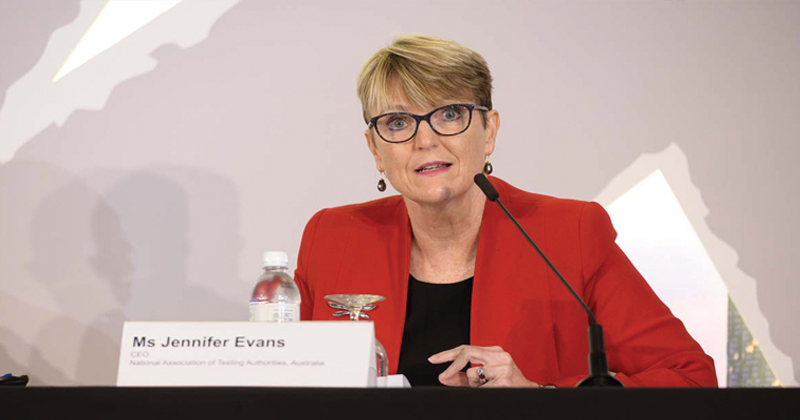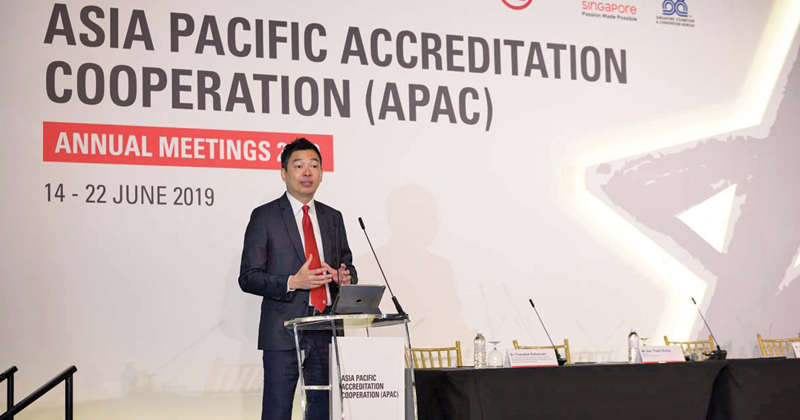As the global market becomes more interconnected, with new technologies changing the way businesses operate, managing supply chains around the world have become more complicated.
Accreditation – providing confidence in companies performing testing, calibration and inspection, validation and verification, as well as certification of products, people and management systems – can help address these challenges and ensure that standards and guidelines are met, noted Ms Jennifer Evans, CEO of the National Association of Testing Authorities, Australia and Co-Chair of the recently formed Asia Pacific Accreditation Cooperation (APAC), who moderated a panel discussion at the APAC Annual Meetings 2019 host economy seminar.

Benefits of using accredited conformity assessment bodies
As more businesses around the world specify accredited services as part of their supplier qualification requirements, companies which had been adopting them would gain a headstart and a competitive advantage over competitors. Accreditation underpins the credibility of goods and services and adoption of standards, and can be used by businesses as a cost-effective technical assurance as overseas markets are more ready to accept the reports of an accredited conformity assessment body (CAB).
With accreditation, businesses are able to reduce the need for re-testing, re-inspection or re-certification of their products, thus lowering costs and time when entering foreign markets. Regulators are also leveraging accredited Testing, Inspection & Certification (TIC) services to ensure the quality and standards of products and services across different application areas.
“Just as divergence of technical regulations and standards can be barriers to trade for manufacturers, deferring accreditation with certification body can pose inefficiencies as well”, Mr Anthony Tan, Vice President & Managing Director, UL (ASEAN & Australasia), said.

Accreditation in the food industry
The food industry is a good example of how accredited TIC services can help businesses protect their brand and reputation, and ease their entry into other markets. With consumers increasingly concerned about the safety and quality of food, independent assurance in the form of accreditation plays a crucial role in demonstrating that products meet applicable standards.
“Accreditation will continue to play an important role in building trust in the food supply chain and food safety system at the global level. For Singapore, more trust in these areas will bring about greater trade flows, industry growth and job creation, and enables local establishments to integrate into global supply chains”, Dr Tan Lee Kim, SFA Director-General & Deputy CEO, said.
Mr Reinaldo Figueiredo, Senior Program Director of the ANSI National Accreditation Board (USA), highlighted that the local Food & Drug Administration’s (FDA) Third-Party Program (TPP) recognises foreign food suppliers and exporters that use accredited third-party certification bodies to conduct food safety audits and issue certification of foreign food facilities, as part of efforts to facilitate the expedited review and entry of food into the USA.
Increasing adoption of voluntary schemes
Governments are also increasingly supporting industry-led voluntary initiatives – business best practices that provide guidance in areas such as design, products and processes – to avoid spending time to develop requirements or regulations if they are already available in the private sector.
An example would be the new accreditation programme for the Programme for Endorsement of Forest Certification’s (PEFC) Chain of Custody Certification that was launched on 17 June 2019. This scheme will not only provide greater support to the industry in meeting the Green Mark requirement for Mass Engineered Timber (PET) to be sourced from sustainably managed forests, but also facilitate recognition and acceptance of certified wood exports to our key trading partners who are members of the Programme for the Endorsement of Forest Certification (e.g. Indonesia, Malaysia, China).
Facilitating trade and market access
Raising recognition of the international accreditation network by governments is invaluable in reducing technical barriers to trade and has helped to bolster international trade agreements.
Singapore Accreditation Council (SAC), the national accreditation body, has signed 16 Mutual Recognition Arrangements (MRAs) covering over 90 economies worldwide, including China, the United States, India and Indonesia. The SAC mark on test, calibration, inspection reports and certificates mean the report is recognised among the MRA partners.
Furthermore, SAC is part of APAC – whose primary role is to manage and expand MRAs among accreditation bodies in the Asia Pacific region – which gives it a regional perspective on market trends and the opportunity to influence and chart the direction of accreditation policies on a regional and global level. This helps to build the Singapore brand and leadership in the quality and conformance arena. As chair of APAC, SAC can help drive the value and impact of Singapore’s MRAs and aid accreditation developments in the region.
Tips for businesses
Using a SAC-accredited CAB helps improve your business credibility by showing that your conformity assessment activities meet internationally recognised standards.
Visit www.sac-accreditation.gov.sg to learn more about accreditation and TIC services and how they can help your business.

